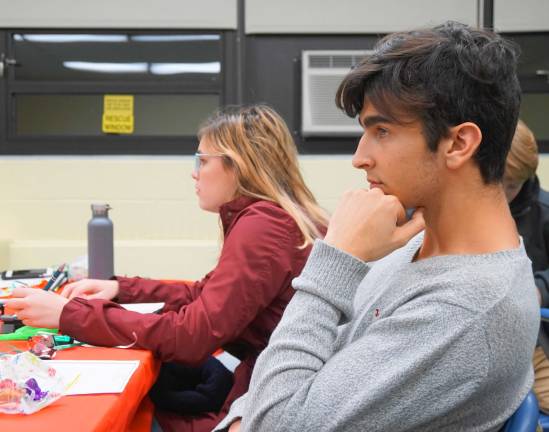Coalition reviews how Poison Control Center works

VERNON — Vernon Coalition Coordinator Rebecca Dorney reviewed how the N.J. Poison Control Center works on Dec. 12 with the Vernon Coalition and Vernon Township High School Youth Action Group students.
Poison Control Centers, Dorney said, upload live data to the National Poison Data System (NPDS) every eight minutes. Thus, she said, the NPDS gives a real-time snapshot of poison call conditions nationwide, even being able to pinpoint dealers or sources if there is a rash of drug related calls in surrounding states at the same time.
Their 24/7, (800) 222-1222 number, Dorney said, is answered by a physician, pharmacist, or nurse, who are trained to walk people through emergencies at home.
Typically, Dorney said, calls are for kids ingesting poisons; and adult and teen calls are for pain medication and depressants.
She reviewed actual poison control calls, like an adult female accidentally eating commercially prepared marijuana edibles, becoming agitated, disoriented and having difficulty breathing. Their response, Dorney said, was to put her in a nice quiet corner, give her water, and make sure she does not pass out.
However, for another call with someone chewing Fentanyl patches, she said, the Poison Control Center would recommend going to the Emergency Room.
Dorney said a couple of Fentanyl grains can be fatal, and dealers use cheaper Fentanyl, at $3,000 per kilo, instead of heroin, at $30,000 per kilo. Thus, now, she said, the opiate epidemic is a pandemic, due to many fatalities.
She also said, some marijuana edibles have the Poison Control number printed on the wrapper. The effect of ingesting edibles, she added, takes one to three hours after consumption and lasts 24 hours; while the effect of smoking marijuana takes 8-10 minutes, lasting 4-6 hours.
A dose of THC – the psycho-active ingredient in marijuana – is 10 milligrams, Dorney said, and marijuana soda has over 100 milliliters of THC, thus, easily leading to overdose.
Dorney also said, people do not know to call the Poison Control Center if someone has abused any drug, including alcohol. Under the “Good Samaritan Law,” Dorney explained, neither the caller nor person – even if under-aged – would be prosecuted at all. However, she added, it is not an excuse to drink, but young people should delay use until 21 years-old.
VTHS student Becka Terzakis asked, would someone be charged for possession if the substances were opiates or Fentanyl?
Dorney answered, if someone calls the Poison Control Center, they will not be prosecuted, nor the person overdosing.
At the end of the presentation, Terzakis said, their action group of high school students was working together and planned to talk with younger students about vaping, who surprisingly vape at a young age.
Glen Meadow Middle School Nurse Stephanie Ash recommended completing an anonymous survey with the Glen Meadow kids, asking if they had tried vaping; do their friends have it; and where do they get it?
Dorney also said, about 34 percent of vapes have marijuana. In addition, she continued, each Juul Pod has over 100 mg of nicotine salts, equivalent to the 100 mg of nicotine found in a pack of cigarettes.
Recently, Dorney said, the FDA no longer allows flavored pods to be manufactured; and they are questioning if methanol should continue in both tobacco and vape products.
Dorney also said, the percentage of Americans smoking had gone down to 9 percent, but the percentage is again increasing due to vaping. Originally vaping, she said, had been created as a smoking cessation option, but the nicotine patch and gum work better. Furthermore, now, she said, people are moving from vaping to cigarettes because they are cheaper.
The Vernon Coalition will host a vaping presentation on Jan. 9.